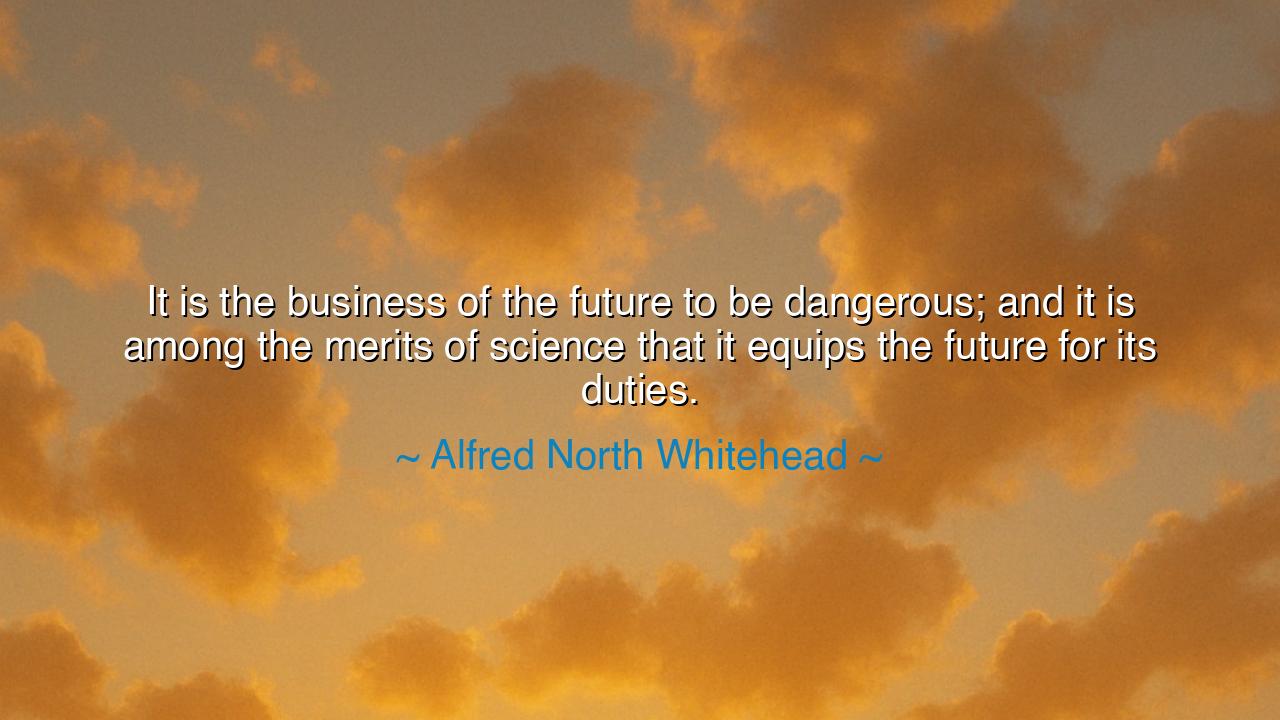
It is the business of the future to be dangerous; and it is among
It is the business of the future to be dangerous; and it is among the merits of science that it equips the future for its duties.






"It is the business of the future to be dangerous; and it is among the merits of science that it equips the future for its duties." These words from Alfred North Whitehead carry with them a profound and unsettling truth. The future, with all its promises of progress and enlightenment, is also fraught with perils and unknowns. As we venture into the unknown, the dangerous landscape of the future, it is the gift of science that provides us the tools to navigate the storm. Whitehead reminds us that while the future may be filled with challenges that seem insurmountable, it is the power of knowledge—the wisdom and strength gained from the pursuit of science—that allows humanity to face these challenges with courage and determination.
In the ancient world, the wise ones understood that the future was never a place of absolute safety or certainty. The ancient Greek philosophers did not seek to create a world where all was calm and peaceful; rather, they recognized that life was filled with challenges and dangers. Plato, in his writings, often spoke of the philosopher-king, a leader who would be trained in wisdom and science to face the uncertainties of the future and guide the people through turbulent times. Similarly, Aristotle recognized that the future required both knowledge and virtue, for it was through understanding the world and human nature that one could best navigate the perils of life. The lessons of the ancients remind us that danger is not something to be feared, but something to be confronted with strength, knowledge, and preparedness.
In the modern age, science serves as the instrument that equips us for the duties of the future. Think of the scientific revolution, which sparked a transformation in human understanding and unleashed a wave of progress that has shaped the world in profound ways. Isaac Newton, with his laws of motion and universal gravitation, did not just uncover the secrets of the natural world—he laid the foundation for future generations to build upon. The knowledge he provided became a tool, a means by which others could navigate the uncertainties of their own time. Albert Einstein, too, with his theory of relativity, showed how science could reveal new realities of space and time—realities that would, in turn, empower future generations to explore the depths of the cosmos.
However, science is not a tool free from responsibility. Whitehead’s quote serves as a reminder that science, though it equips us for the future, also places upon us a heavy burden. The discoveries of science open the door to new possibilities, but they also reveal the dangers inherent in progress. The invention of the nuclear bomb, for example, is a clear testament to this paradox. While the same science that unlocked the mysteries of the atom led to breakthroughs in medicine, energy, and technology, it also gave birth to a weapon capable of unparalleled destruction. In this, we see that science can be used for both good and evil, and it is our responsibility to wield it wisely, guided by both our understanding and our moral compass.
Consider the story of Marie Curie, whose pioneering work in the field of radioactivity revolutionized the world of science and medicine. Her discoveries brought light to new fields of possibility—fields that would later be used to treat cancer and explore the mysteries of the universe. Yet, her discoveries also brought dangers she could not have foreseen, as the very elements she studied would lead to her own illness and death. Curie’s life is a profound example of the dual nature of science—its power to heal and to harm, to build and to destroy. And yet, through it all, she remained dedicated to the idea that knowledge, though dangerous, was worth the risk because of its potential to serve humanity.
In Whitehead’s view, then, it is not just science that equips the future, but wisdom in its use. The future will always hold challenges that seem dangerous, but it is the wisdom gained through science that provides us the tools to meet those challenges head-on. Just as Plato and Aristotle recognized the need for leaders who could understand and apply knowledge in service of society, we too must cultivate wisdom—not only in the fields of science and technology, but also in ethics, morality, and humanity. We must ensure that the tools we create are used to uplift, not destroy, and that the power of science is tempered with an unwavering commitment to the greater good.
The lesson is clear, dear ones: science is not inherently dangerous, nor is it inherently safe. It is a tool, a way of knowing, and it is up to us how we wield it. The future will always hold danger, but it is through knowledge, dedication, and wisdom that we can meet the challenges ahead. Let us, like the great philosophers and scientists of the past, embrace the responsibilities that come with discovery. Let us use the tools of science to prepare ourselves for the duties of the future—not just to understand the world, but to guide it toward a future of peace, justice, and progress. The future is dangerous, but with the right tools and the right wisdom, we can face it with courage and resolve.






AAdministratorAdministrator
Welcome, honored guests. Please leave a comment, we will respond soon